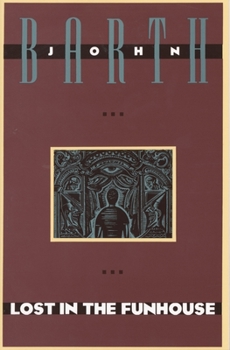Lost in the Funhouse
Select Format
Select Condition 
Book Overview
NATIONAL BOOK AWARD FINALIST - John Barth's lively, highly original collection of short pieces is a major landmark of experimental fiction exploring themes of purpose and the meaning of existence. " Barth] ran riot over literary rules and conventions, even as he displayed, with meticulous discipline, mastery of and respect for them." --The New York Times From its opening story, "Frame-Tale"--printed sideways and...
Format:Paperback
Language:English
ISBN:0385240872
ISBN13:9780385240871
Release Date:March 1988
Publisher:Anchor Books
Length:224 Pages
Weight:0.51 lbs.
Dimensions:0.5" x 5.2" x 8.5"
Customer Reviews
3 ratings
Stretching short stories
Published by Thriftbooks.com User , 22 years ago
I will admit that there are plenty of classic masterpiece quality short stories out there, collections or otherwise. I'm just not an avid reader of them . . . maybe I just like big hefty books, maybe I don't like switching gears every twenty pages or so . . . who knows? But I do like Barth and this is pretty short so I figured, what the hey? Unlike most short story collections which generally just wait until an author has enough stories to fill a book before publishing, this book was originally conceived as a group of short stories that in some form or another share the same thematic elements and much like an album, is sequenced into a proper order and should be read that way. So he says. Barth admits in the foreword that he doesn't normally write short stories and this was his attempt at playing with the medium, which as you might suspect gives you all kinds of hit or miss stories . . . generally the quality is pretty high and for such an academic guy, Barth's pretty funny (he can respect and make fun of mythology at the same time without seeming smug or arch, which I think is hard to do) and if the humor's on, then for the most part that can carry the nuttier moments. Basically it's a "post-modern" sort of short story collection, so there aren't many compromises to things like form or structure or plot (one story is essentially a Moebius strip) which has the effect of making some stories feel like little more than academic exercises in form, rendering them a bit distant emotionally. Like looking at abstract art I guess, you can admire the technique even as you can't appreciate the emotion behind it. But when the collection works, it works great. The title story is my personal favorite, but the last one is the best of the mythology based ones (parts of this seem like a runthrough for Chimera) and overall if you're not looking for Joycean slice of life tales or knotted little tales of suspense, but instead an attempt to bend the rules a bit, then you'll probably like this. Not Barth's best work but it's short and the gems outweigh the duds by a good margin, so it could be worse.
laizzez-faire postmodernism
Published by Thriftbooks.com User , 24 years ago
John Barth is not a doctrinaire postmodernist. He does not reject the label of 'postmodernist writer', but he is not interested in following the doctrine to logical end. That would apparently take the fun out of the funhouse.This book is a series of essays, meditations, short stories and jokes that examine the creative process as ontogeny. Barth is funny and melancholy at the same time. He is skeptical, but also to some degree hopeful, about the possibility of writing anything that could be useful to someone else.His enthusiastic and hilarious references made me want to read or re-read many classic pieces of literature including Allen Ginsberg's "Howl", Ovid's "Metamorphoses" and the Iliad and "1001 Arabian Nights". And he made me believe that I could get a lot more out of them, if I would just question a few more of my presumptions.
Fantastic collection of experimental fiction!
Published by Thriftbooks.com User , 28 years ago
In his story, "The Immortal," Jorge Luis Borges describes a labyrinth as "a structure compounded to confuse men; its architecture, rich in symmetries, is subordinated to that end."* Similarly, the stories of Barth's collection _Lost in the Funhouse_, present a labyrinth of narrative fiction, in their exploration of the story as medium, voice, and tool of the magician. The fourteen stories, reflecting Barth's idea of a narrative as a structure, take the varied forms of Mobius strip, letter, autobiography, and tale; what makes for additional complexity, is the insistence by each of the stories' characters (who include a siamese twin, heroes of the Odyssey,and an abandoned court minstrel) to have his or her say. Inherent in this is Barth's insistence on the infinite number of possible constructions of a narrative, which stun the reader through his descriptions, plot lines (knots, in some cases), and ideas. Read _Lost in the Funhouse_ to witness Barth's magic, and to be reminded of the combined power of voice and language, storytelling. *(Jorge Luis Borges, "The Immortal," _Labyrinths_: New Directions Books, 1962.)






